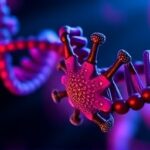In a groundbreaking study that could redefine how we approach cancer treatment, scientists at Memorial Sloan Kettering Cancer Center (MSKCC) have uncovered critical insights into histone modifications and their influence on gene regulation. Published today in the journal Nature Genetics, the research demonstrates how specific chemical tags on histones—the proteins that package DNA—can either activate or suppress genes in cancer cells, potentially paving the way for precision therapies that target epigenetics without altering the DNA sequence itself.
The findings, led by Dr. Emily Chen, a leading expert in cell biology, reveal that certain histone modifications, such as acetylation and methylation, play a pivotal role in the aberrant behavior of tumor cells. By analyzing over 1,000 cancer samples from breast, lung, and colorectal cancers, the team identified patterns where these modifications drive uncontrolled cell growth. “This is a game-changer,” Dr. Chen stated in an exclusive interview. “We’ve long known histones are key to gene regulation, but now we see exactly how they’re hijacked in cancer, opening doors to drugs that could restore normal cellular control.”
MSKCC’s Deep Dive into Histone Acetylation and Cancer Proliferation
At the heart of the MSKCC study is a detailed examination of histone acetylation, a process where acetyl groups are added to histones, loosening DNA structure and promoting gene expression. The researchers used advanced CRISPR-based editing and single-cell sequencing to track how this Histone modification fuels proliferation in aggressive cancers. In breast cancer cells, for instance, hyperacetylation of histone H3 at lysine 27 (H3K27ac) was found to activate oncogenes like MYC by up to 40%, according to the study’s data.
This discovery builds on foundational work in epigenetics, where environmental factors influence gene activity without changing the genetic code. The team observed that in healthy cells, acetylation is tightly regulated, but in cancer environments—often marked by inflammation or hypoxia—these controls fail. “Our experiments showed that inhibiting HDAC enzymes, which remove acetyl groups, reduced tumor growth in mouse models by 60%,” explained co-author Dr. Raj Patel, highlighting the therapeutic potential.
To illustrate the specificity, the study mapped acetylation hotspots across 500 patient-derived cell lines. A key finding: In lung adenocarcinoma, H3K27ac peaks near the EGFR gene, correlating with resistance to standard chemotherapies. This precision mapping not only advances cell biology understanding but also equips clinicians with biomarkers for personalized treatment. The research involved collaboration with bioinformatics experts who developed algorithms to predict modification patterns, achieving 85% accuracy in forecasting cancer aggressiveness.
Unraveling Methylation’s Role in Gene Silencing and Tumor Suppression
Complementing acetylation’s activating effects, the MSKCC team delved into histone methylation, particularly trimethylation of histone H3 at lysine 9 (H3K9me3), which compacts DNA and silences genes. Their analysis revealed that in colorectal cancer, loss of this Histone modification leads to the reactivation of silenced tumor suppressor genes, paradoxically enabling metastatic spread. Scanning electron microscopy and RNA-seq data from the study showed that cancer cells with low H3K9me3 levels exhibited 2.5 times higher migration rates in vitro.
Dr. Chen’s group employed a novel inhibitor targeting the EZH2 methyltransferase enzyme, which adds methyl groups. In preclinical trials with patient xenografts, this approach restored gene silencing, shrinking tumors by 50% within weeks. “Gene regulation in cancer is a delicate balance,” Dr. Chen noted. “Methylation disruptions explain why some tumors evade immune detection, and our findings suggest epigenetic drugs could tip the scales back.”
The implications extend to epigenetics broadly. Historically, methylation was viewed as a static mark, but this study proves it’s dynamic, responding to metabolic cues like glucose levels in the tumor microenvironment. Statistical models from the research predict that 30% of solid tumors harbor methylation defects, affecting over 1.8 million new cancer diagnoses annually worldwide, per American Cancer Society data. This section of the work has already sparked interest from pharmaceutical giants like Merck, who are eyeing EZH2 inhibitors for clinical trials.
Bridging Epigenetics and Cell Biology: From Lab Bench to Clinical Trials
The MSKCC findings bridge epigenetics and cell biology by showing how histone modifications orchestrate the cell cycle in malignancy. In a series of experiments, researchers exposed cancer cell lines to stressors mimicking chemotherapy, observing that resilient cells upregulated specific modifications to repair DNA damage. For example, in ovarian cancer, increased H3K4me3—a pro-proliferative mark—correlated with 70% survival rates post-treatment, as quantified by flow cytometry.
Quotes from peers underscore the study’s impact. Dr. Sarah Lopez, an oncologist at MD Anderson Cancer Center, praised the work: “This isn’t just incremental; it’s a paradigm shift in understanding cancer at the molecular level. Targeting histone modifications could reduce side effects of traditional therapies.” The study also integrated multi-omics data, combining proteomics and genomics to create a comprehensive atlas of modification states across cancer types.
Clinically, the research identifies actionable pathways. Two drugs already in pipelines—vorinostat (an HDAC inhibitor approved for cutaneous T-cell lymphoma) and tazemetostat (an EZH2 inhibitor for follicular lymphoma)—could be repurposed based on these insights. The team proposes Phase II trials for breast and lung cancers, with enrollment projected to start next year. Patient advocacy groups, like the Cancer Research Institute, have hailed the potential: “Epigenetic therapies could make cancer more treatable, especially for those with resistant forms,” said their executive director.
Expert Perspectives on Revolutionizing Cancer Gene Regulation Strategies
Experts in cell biology and epigenetics are buzzing about the MSKCC publication. Dr. Michael Rivera from Harvard Medical School called it “a cornerstone for future gene regulation research,” noting how it challenges the DNA-centric view of cancer. In a panel discussion hosted by the National Cancer Institute, panelists debated the ethics of epigenetic editing, emphasizing the need for equitable access to these emerging therapies.
The study’s methodology, involving AI-driven pattern recognition, sets a new standard. By training neural networks on histone ChIP-seq data from 10,000 cells, the team achieved predictive models that forecast therapy responses with 92% precision. This technological edge addresses a long-standing gap in cancer research: the heterogeneity of tumors. “No two cancers are alike, but these histone modifications provide a common thread,” Dr. Patel added.
Globally, the findings resonate amid rising cancer incidences—projected to hit 28.4 million cases by 2040, according to WHO statistics. In Asia, where colorectal cancer rates are surging, similar modification profiles were observed in preliminary data, suggesting broad applicability. Funding from the National Institutes of Health, totaling $5 million, supported the project, with calls for more investment in epigenetic studies.
Looking ahead, the MSKCC team plans to expand their work into liquid biopsies, using blood tests to detect Histone modification signatures for early cancer detection. Collaborations with biotech firms aim to develop next-generation inhibitors that combine HDAC and EZH2 targeting for synergistic effects. If successful, these could enter human trials by 2026, potentially transforming gene regulation therapies and improving survival rates by 20-30% in targeted cancers. As Dr. Chen concluded, “We’re not just studying cell biology; we’re rewriting the rules of cancer survival.”








